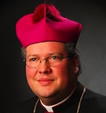
Prime Bishop Anthony Mikovsky
The Seed is the Word of God
During this portion of the Ordinary Time season as we work our way through the Gospel of St. Matthew, we encounter a number of parables of our Lord. On the 15th Sunday in Ordinary Time this year we hear the Parable of the Sower. “And [Jesus] told them many things in parables, saying: ‘Listen! A sower went out to sow. And as he sowed, some seeds fell on the path, and the birds came and ate them up. Other seeds fell on the rocky ground, where they did not have much soil, and they sprang up quickly, since they had no depth of soil. But when the sun rose, they were scorched; and since they had no root, they withered away. Other seeds fell among thorns, and the thorns grew up and choked them. Other seeds fell on good soil and brought forth grain, some a hundredfold, some sixty and some thirty. Let anyone with ears listen!’” (Matthew 13:3-9)
This parable is one that is very meaningful to Polish National Catholics since we know the power of God’s Word and how the presence of Christ comes to us in its hearing and explanation especially within the liturgical context of Holy Mass. Within the PNCC Catechism, this parable is explicitly referenced although it’s the same parable taken from the Gospel of St. Luke. The Catechism asks: “Why should we receive the Sacrament of the Word of God?” With the answer: “We should receive the Sacrament of the Word of God because Christ commanded us to receive and proclaim it. Holy Scripture says this: 1) “Go ye therefore, and teach all nations.” (Mt 29:19); 2) “The seed is the Word of God.” (Lk 8:11); 3) “Blessed are they that hear the Word of God and keep it.” (Lk 11:28); 4) “You have been born again … through the living and abiding Word of God.” (1 Pt 1:23); 5) “Man does not live by bread alone, but by every word that proceeds from the mouth of God.” (Mt 4:4)
As in all parables, we are called to ponder and reflect on these words of our Savior and how they become operable in our own lives. Although Jesus does go on later in the Gospel of Matthew to explain this parable to His disciples, this does not remove from us the duty to reflect on exactly what is being required of us in this teaching.
A first matter that is often missed as we go through the parable is the seed itself, and this is because of our own experience. When we desire to plant something from seed today, we often go to a store and buy a little packet of seeds, take it home and plant the seeds. Or maybe we even skip this step entirely and buy small, germinated seedlings which are ready to go into the ground. We have lost the reality that getting seed is hard work. In our Lord’s day, the farmer had to reserve some of last year’s crop and allow it to go to seed, then that seed needed to be collected and kept for the following growing season. Because of this a sower would most likely be very careful and judicious when sowing.
So a first reality we see within this parable is that there is really a generous abandon in how the seed is spread. It goes everywhere, on the path, on the rocky ground, among the thorns as well as on the good soil. This shows to us the graciousness of our Lord in
giving His Word to His people. It is also an encouragement to the ministers of the Church, the bishops, priests and deacons to be equally generous in their preaching and announcement of the Word. It is for this reason that the PNCC Ritual states: “The clergy are reminded that … the obligation to preach should not be omitted on any Sunday or Solemnity within the church year.” (PNCC Ritual, page 44) As a young priest I was told at St. Stanislaus Cathedral that we would preach at every service where the faithful gathered.
Another important reality for the hearers of the Word of God is a consideration of the places where the seed falls. At first the seed falls on the path. Jesus tells us that the seed on the path is the one who hears the Word of the kingdom and does not understand it, so the evil one comes and snatches it away. But we also must remind ourselves that paths are things that are intentionally made in an area by others. So then, we must consider not to create for others, places and conditions where they will not be able to hear or accept the Word of God. Such is the case when we keep ourselves or others away from Church. This also may happen when we become poor examples to others of Christian life and behavior.
The second place where the seed falls is the rocky ground. The plants there wither, because they have no roots. We must consider what happens that does not allow the roots of faith to grow in ourselves or others and our role in that action. Do we feed ourselves on the Holy Eucharist to allow Jesus to strengthen us? Do we discourage others from living out their faith in the strongest possible way?
The third place the seed falls is among the thorns and there the seed is choked and produces no fruit. Jesus tells us that the thorns are the ‘cares of the world and the lure of wealth.’ Now, while we might not be responsible for these temptations in the lives of others, we can certainly ask what are we doing about it? If we saw thorns growing in our garden at home, we wouldn’t just throw up our hands and say, ‘Well isn’t that a shame.’ Would we not rather seek ways to remove them? Now maybe we might not be successful, or have it work entirely, but we would still certainly try.
And of course, this leads us to a consideration of the final place where the seed lands. The seed also falls on good soil where it produces abundant fruit, as Jesus tells us, a hundred-, or sixty- or thirtyfold. In reflection here we must acknowledge that good soil, while it might happen naturally, is also something that can be accomplished through a large amount of work. It’s true, both for the industrial farmer as well as the home gardener. We till the soil, fertilize the soil, water the soil, and weed it while the plants grow. And we don’t just do these actions once, but we continue to do them in preparation for the seed and also the whole time the plants are growing. Good soil takes work.
If we desire to be the good soil that produces fruit in response to the Word of God sown in us, then work in preparation and work in response is called for. It is for this reason that the homily in Church is preceded by a hymn to the Holy Spirit. This is the work of prayer to get us ready to receive the Word of God and be strengthened by it. If that hymn is not sung, we should at least say a Prayer to the Holy Spirit, asking His blessing to open our hearts and minds. Likewise, the penitential rite during Holy Mass allows us to approach the Sacrament of the Word of God with clean hearts to hear our Lord and Savior. The Eucharist which we receive at Holy Mass allows us to be strengthened to go out into the world to fulfill this Word and then bear fruit a hundred-, or sixty-, or thirtyfold in our Christian lives.
So my brothers and sisters, in reflection on this parable, and also on the importance of Holy Scripture and the Sacrament of the Word of God within our Holy Church, I encourage all of you to resolve to work on the good soil of your lives: attend Holy Mass to hear the Word of God and be strengthened by the Holy Eucharist; encourage each other in your lives of faith and good works; immerse yourself in the Bible to better understand the ways of God and the teachings of our Lord. Jesus said: “The seed is the Word of God.” Let’s be ready to receive His Word and produce fruit for the Kingdom.

